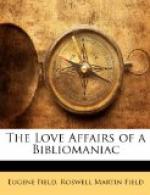In boyish dreams I saw again
Bucolic belles
and dames of court,
The princely youths and monkish
men
Arrayed for sacrifice
or sport.
Again I heard the nightingale
Sing as she sang
those years ago
In his embowered Italian vale
To my revered
Boccaccio.
And still I love that brown old
book
I found upon the
topmost shelf—
I love it so I let none look
Upon the treasure
but myself!
And yet I have a strapping boy
Who (I have every
cause to know)
Would to its full extent enjoy
The friendship
of Boccaccio!
But boys are, oh! so different now
From what they
were when I was one!
I fear my boy would not know how
To take that old
raconteur’s fun!
In your companionship, O friend,
I think it wise
alone to go
Plucking the gracious fruits that
bend
Wheree’er
you lead, Boccaccio.
So rest you there upon the shelf,
Clad in your garb
of faded brown;
Perhaps, sometime, my boy himself
Shall find you
out and take you down.
Then may he feel the joy once more
That thrilled
me, filled me years ago
When reverently I brooded o’er
The glories of
Boccaccio!
Out upon the vile brood of imitators, I say! Get ye gone, ye Bandellos and ye Straparolas and ye other charlatans who would fain possess yourselves of the empire which the genius of Boccaccio bequeathed to humanity. There is but one master, and to him we render grateful homage. He leads us down through the cloisters of time, and at his touch the dead become reanimate, and all the sweetness and the valor of antiquity recur; heroism, love, sacrifice, tears, laughter, wisdom, wit, philosophy, charity, and understanding are his auxiliaries; humanity is his inspiration, humanity his theme, humanity his audience, humanity his debtor.
Now it is of Tancred’s daughter he tells, and now of Rossiglione’s wife; anon of the cozening gardener he speaks and anon of Alibech; of what befell Gillette de Narbonne, of Iphigenia and Cymon, of Saladin, of Calandrino, of Dianora and Ansaldo we hear; and what subject soever he touches he quickens it into life, and he so subtly invests it with that indefinable quality of his genius as to attract thereunto not only our sympathies but also our enthusiasm.
Yes, truly, he should be read with understanding; what author should not? I would no more think of putting my Boccaccio into the hands of a dullard than I would think of leaving a bright and beautiful woman at the mercy of a blind mute.
I have hinted at the horror of the fate which befell Yseult Hardynge in the seclusion of Mr. Henry Boggs’s Lincolnshire estate. Mr. Henry Boggs knew nothing of romance, and he cared less; he was wholly incapable of appreciating a woman with dark, glorious eyes and an expanding soul; I’ll warrant me that he would at any time gladly have traded a ``Decameron’’ for a copy of ``The Gentleman Poulterer,’’ or for a year’s subscription to that grewsome monument to human imbecility, London ``Punch.’’




